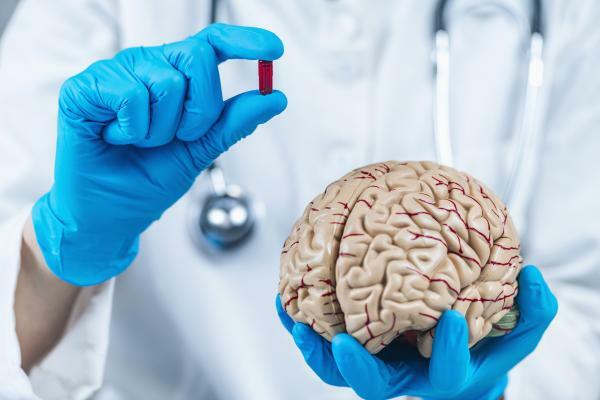
Antidepressants generally do not harm the brain, but their effects can vary depending on the type, dose, and person taking them, and have both positive and negative effects. Specifically, antidepressants are drugs for mood disorders such as depression, although there is some controversy about whether they can harm the brain.
In this Psychology-Online article, we explain if antidepressants damage the brain. Discover the physiological process of the most common antidepressants. We also analyze how they act in the brain, that is, what are their positive and negative effects. In addition, we will talk about the consequences of taking antidepressants for many years.
Antidepressants are medicines used to treat mood disorders, such as depression. Although there are several types of antidepressants, their main action is based on the modulation of the activity of certain neurotransmitterssuch as serotonin, norepinephrine, and dopamine. In this article you will find information about what are neurotransmitters.
Next, we will tell you how antidepressants intervene in certain neurotransmitters:
- Selective serotonin reuptake inhibitors (SSRIs): they act on serotonin, a neurotransmitter involved in the regulation of mood, sleep, appetite and sexuality. SSRIs block the reuptake of serotonin into the synapse, increasing its availability in the brain, thus which improves the transmission of nerve signals between brain cells, improving mood and reducing anxiety.
- Selective norepinephrine reuptake inhibitors (SNRIs): They act on norepinephrine, another neurotransmitter involved in regulating mood, sleep, and attention. ISRNs block the reuptake of norepinephrine into the synapse, increasing its availability in the brain and improving nerve signal transmission.
- Serotonin and norepinephrine reuptake inhibitors (SNRIs): This type of antidepressants combine the effects of SSRIs and SNRIs. These drugs are especially useful for treating major depression, generalized anxiety disorder (GAD), and post traumatic stress disorder (PTSD).
- Dopamine reuptake inhibitors (IRDs): they act on the dopamine neurotransmitter, involved in the regulation of mood and motivation. IRDs are less common than SSRIs and SNRIs, but are used in some cases of treatment-resistant depression.
Although antidepressants can improve the symptoms of depression, their effect is not immediate, as it can take several weeks to become evident. This is because antidepressants produce gradual changes in signal transmission that depend on brain circuitry adapting to the new availability of neurotransmitters. In addition, the effects of antidepressants may vary from person to person and type of disorder that is being treated
Mood disorders are associated with altered levels of certain neurotransmitters in the brain. In this sense, what do antidepressants do? They are drugs that act on altered neurotransmitters. Next, we will see if taking antidepressants is bad, that is, how they affect the brain.
Positive effects of taking antidepressants
Antidepressants can have positive effects on the brain by increasing levels of neurotransmitters such as serotonin, norepinephrine, and dopamine.
- Help improve mood: SSRIs increase the availability of serotonin in the brain by preventing nerve cells from reabsorbing it, thus improving mood and reducing anxiety.
- Increase neural plasticity: antidepressants increase the brain's ability to change and adapt to new environments For example, depression may be associated with reduced neural plasticity, but antidepressants help reverse this by increasing the production of growth factors, such as brain-derived neurotrophic factor (BDNF). This neurotrophin helps brain cells grow and strengthen neural connections, which improves mood and cognition.
- Improve the emotional response of the brain: Mood disorders may be associated with a blunted or inappropriate emotional response. This decreases the person's ability to manage emotions properly, both positive and negative. In this sense, antidepressants help restore a healthy emotional response by increasing the availability of neurotransmitters, such as serotonin and norepinephrine.
Negative effects of taking antidepressants
The main question that arises is whether antidepressants damage the brain. As with any medication, taking antidepressants can cause certain side effects. secondary, which vary according to the type of antidepressant, the dose and the characteristics of the person who takes it The most common dangers of antidepressants are:
- Drowsiness.
- dry mouth
- Nausea.
- Diarrhea.
- Weight gain.
- Dizziness.
- Confusion.
- Memory problems.
- Sexual dysfunction, such as decreased libido, erectile dysfunction, and difficulty reaching orgasm.
These side effects are usually mild and go away after a few weeks of treatment. Even so, some patients may experience more serious side effects, such as changes in heart rhythm either difficulty breathing.
In addition, there is some controversy over possible increased risk of suicide in children, adolescents, and young adults taking antidepressants. Some studies have suggested that antidepressants may increase the risk of suicidal thoughts and behavior in these age groups. However, other studies have questioned this association and have suggested that antidepressants may have a protective effect against suicide in some patients.
First of all, it is important to keep in mind that the effects of antidepressants are not immediate, as they can take several weeks to manifest themselves. Some patients may not respond to treatment at all, and others need to take long-term antidepressants to prevent a depression relapse or a mood disorder.

This article is merely informative, at Psychology-Online we do not have the power to make a diagnosis or recommend a treatment. We invite you to go to a psychologist to treat your particular case.


